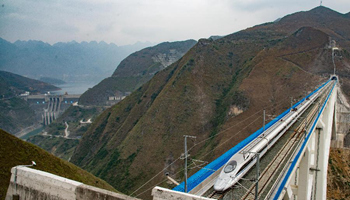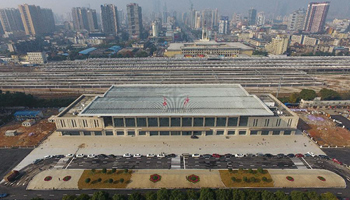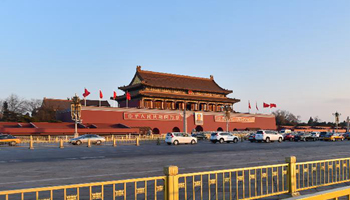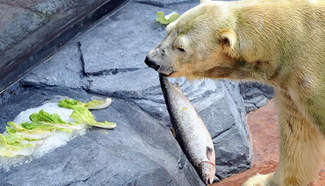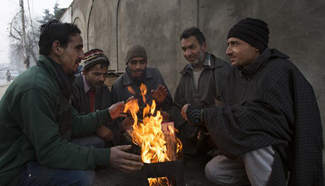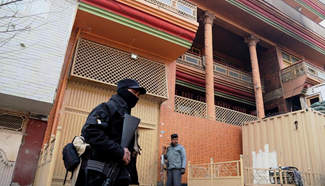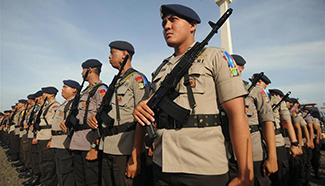by Ding Chao
MOSCOW, Dec. 22 (Xinhua) -- If outgoing U.S. President Barack Obama would bother to assess what Washington has gained in his administration's anti-Russia attempts since the outbreak of the Ukraine crisis in early 2014, he might be sad to find that Washington has lost in almost every front -- from Ukraine to Syria, and then to the looming new arms race.
By contrast, Russian President Vladimir Putin, who is experienced in jangling nerves in the West with unexpected tactical moves, was widely regarded to have broken out of the diplomatic, military and economic encirclement led by the United States.
Throughout the year 2016, Russia has been trying hard by diplomatic maneuvers to gain a bigger say in the protracted Syrian crisis, which has helped consolidate its role in the Middle East, and in the meantime, Moscow has stepped up its own version of a "Pivot to Asia" with a focus on the economic sphere.
MILITARY FEELERS IN SYRIA
Starting with a dramatic bombing campaign in Syria in September 2015, Russia's first military intervention outside the former Soviet Union since the end of the Cold War, the country has not only showed its ability in the global use of force that the United States has long bragged about, but gained increasing political leverage in the war-ravaged country and even the wider region, reminding the United States not to treat Russia as an outsider when it comes to one of the most complicated regions in the world.
The mission let the already deep rift between the two powers further fester as Washington slammed Moscow for not intending to hit terrorist targets, but to empower Syrian government troops, and the White House was considering striking Bashar al-Assad's forces in an attempt to bring Damascus back to the negotiating table.
Russia, in response, deployed the advanced S-400 and S-300 anti-aircraft missile systems in Syria, warning to shoot down U.S.-led coalition missiles if they were used against the Syrian army. Moreover, in September, Russia's only aircraft carrier, the Admiral Kuznetsov, was put in combat duty off Syria's coast to support its air mission.
Admittedly, this show of Russia's military prowess did come with a cost. The most recent cost was the assassination of its ambassador to Turkey, Andrei Karlov, who was shot dead by an off-duty Turkish policeman in Ankara, an act believed to be linked with Moscow's anti-terror operation in Syria.
In November 2015, a Russian bomber was downed by a Turkish fighter jet near the Syrian-Turkish border, an incident described by Putin as "a stab in the back" that dealt a crushing blow to Moscow-Ankara ties, which have only begun to recover after Turkish President Recep Tayyip Erdogan apologized to Putin in June.
Washington's decision in October to suspend its dialogue with Moscow on Syria is a golden opportunity for Russia to boost its presence in the Syrian settlement. Backed by Russia's air force, the Syrian army encroached on the contested city of Aleppo and cleared the northern Syrian city of militants with the evacuation of civilians, which would jump-start the liberation of other Syrian cities.
U.S. Secretary of State John Kerry told the Boston Globe in a recent interview that he regretted Washington failed to "set up a joint cooperative effort" because of differences in the U.S. government. By quitting the talks, the United States ended up as a non-cooperator.
TIT-FOR-TAT WITH WEST
The standoff between Russia and the United States reached its climax in October when Moscow halted an agreement with Washington on the disposal of weapons-grade plutonium because of "hostile actions" by the United States. Before that in April, Putin was absent from a nuclear security summit held in Washington. This means that the two powers have broken in their last possible area of cooperation -- non-proliferation, in addition to anti-terrorism, which, too, has failed, as evidenced by their differences on Syria.
Accusations of Russia's involvement in the U.S. presidential elections have been frequently heard during the whole campaign, and they have been heating up recently as Obama, at his wits' end, accused Putin of personally sponsoring the hacking of Democratic Party emails, which was believed to have helped Donald Trump secure the presidency. According to Maria Zakharova, spokeswoman for the Russian Foreign Ministry, Moscow has demanded facts from Washington on the investigation, but "there is silence on the opposite side."
Meanwhile, Russia and NATO, perceiving each other as mutual threats, have been increasingly flexing their muscles in Eastern Europe, which indicates the risk of a new arms race. NATO's eastward expansion, military buildup close to the Russian borders and frequent drills have been met with Russia's warning to exit the Strategic Arms Reduction Treaty, which has set a limit to the number of nuclear warheads and ballistic missiles Russia and the United States can keep.
The Western alliance criticized Moscow for declining all its proposals for cooperation on a regime to ensure missile defense transparency, while Moscow feels it isn't trusted by the military bloc and fears being encircled. The ever-deepening distrust only risks a new Cold War that will compromise everyone's security.
The European Union (EU), a traditionally important partner of cooperation with Russia and highly dependent on its energy and natural gas, now seems unsure of how to work with Moscow, while increasingly following Washington's lead in absence of independent judgment.
The EU has decided to extend sanctions against Russia for another six months, until July 31, 2017. European Council President Donald Tusk even admitted that the EU was awaiting a clarification of the new U.S. administration's policy in relation to Russia, a move that Moscow said only demonstrated the weakness of the alliance.
Brussels decided to expand the sanctions based on such an assertion that Russia failed to honor its commitments in the Minsk agreement aimed at ending the conflict in eastern Ukraine, while Moscow insists it is Kiev that should be blamed for the failure of the deal that they agreed upon together with France and Germany.
Russia has responded with countermeasures of its own, and so far, there is no sign of any ease of the diplomatic stalemate except for the resulting reciprocal sanctions. But Moscow has at least gained an upper hand in thwarting Kiev's pursuit of EU membership, in addition to the takeover of the militarily significant Crimea peninsula.
TURNING EAST
There is no denying that Russia's constrained economy in the past two years has been in part caused by the confluence of sluggish oil prices and Western sanctions. This does not get down to the very essence of the issue, however.
In his annual state of the union address to Russia's Federal Assembly earlier this month, Putin explicitly said that "internal problems" have been the main reasons for the country's economic slowdown. With its advantages of a large domestic market, rich natural resources and vast underdeveloped territory in its Far East, Moscow sees great potential in improving ties with its Asia Pacific neighbors in a bid to get itself out of the plight.
Russia launched the first Eastern Economic Forum in the Far Eastern port city of Vladivostok in September 2015, and the second one was held as scheduled this autumn in the same city with participants from across Eurasia. A number of agreements were inked at both forums on boosting cooperation with China, Japan and South Korea, among others, with a view to attracting investment from eastern Asia for Russia's development projects and expanding exports to the Asia-Pacific market.
In Russia's Black Sea city of Sochi in May, Russia and the Association of Southeast Asian Nations (ASEAN) signed a five-year action plan to boost cooperation and deepen their partnership. Trade volume between Russia and ASEAN members was 13.7 billion U.S. dollars in 2015, rather modest compared with ASEAN's trade performance with some other countries in the Asia-Pacific region.
Russia has given special emphasis to link its development programs with those of China, particularly the alignment of the Belt and Road Initiative with the Russia-led Eurasian Economic Union. In the energy sector, the construction of the Eastern Route pipeline proceeded smoothly this year, and it is expected to start supplies to China in 2018. China is developing Russia's first high-speed rail line connecting Moscow and Kazan with an investment of about 300 billion rubles (5.2 billion dollars).
What's more, the two sides are working on a joint program of developing and building wide-body aircraft, a model of which was displayed at this year's Zhuhai Air Show in south China's Guangdong Province. Financial institutions of both countries have clinched agreements to support those projects.




